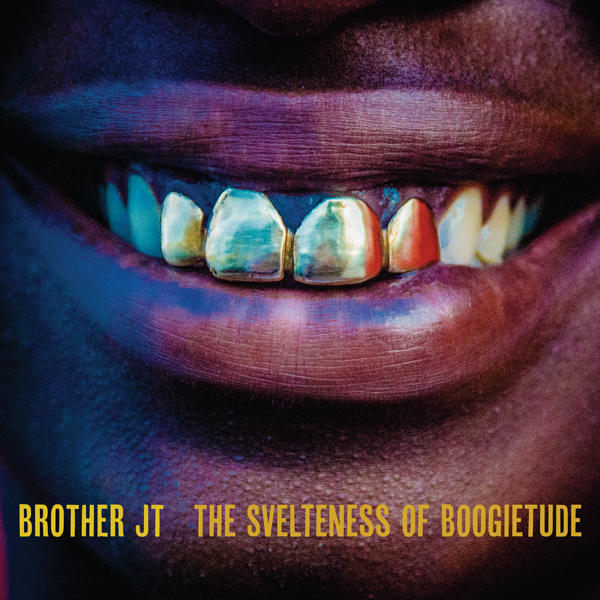![]() BY JONATHAN VALANIA Garage-punk savant, drone-rock wizard, acid-dazed psychonaut, human ouija board, holy fool of the Internet — Brother JT is a man of many hats. He’s been a puppet, a poet, a pirate, a pawn and king. He’s been up and down and over and out — and he still really likes the LSD thing. (SEE Trippin’ Balls With Brother JT, his lysergic talk show on Scrapple TV) He’s come to tell us all that the emperor has no clothes, the sky is falling, God is great, we’re already dead, and yet despite all that life is beautiful. He’s also leading the protest movement against the war going on in this country about looking good. He plays Johnny Brenda’s Saturday in support of the just-released and most def The Svelteness Of Boogietude (Thrill Jockey) with The Photon Band featuring prodigal son Art DiFuria and JJL, Jay Laughlin of Lenola fame’s new project. Expect the sorta cerebellum-tickling, zap-your-head psychedelic sturm und drang the good Brother has been cranking out in one form or another for going for going on 25 years. Some nudity implied. To mark the occasion we are re-posting this 2011 interview with the good brother: Discussed: Lee Harvey Oswald, the JFK assassination, mental illness, hallucinogens, God, the narrative arc of garage-rock in the Lehigh Valley, his failed cooking show In The Kitchen With Brother JT and the rise and fall of his old band The Original Sins, whose 1987 debut Big Soul was declared one of the best albums of the 1980s by none other than the New York Times. Dig it!
BY JONATHAN VALANIA Garage-punk savant, drone-rock wizard, acid-dazed psychonaut, human ouija board, holy fool of the Internet — Brother JT is a man of many hats. He’s been a puppet, a poet, a pirate, a pawn and king. He’s been up and down and over and out — and he still really likes the LSD thing. (SEE Trippin’ Balls With Brother JT, his lysergic talk show on Scrapple TV) He’s come to tell us all that the emperor has no clothes, the sky is falling, God is great, we’re already dead, and yet despite all that life is beautiful. He’s also leading the protest movement against the war going on in this country about looking good. He plays Johnny Brenda’s Saturday in support of the just-released and most def The Svelteness Of Boogietude (Thrill Jockey) with The Photon Band featuring prodigal son Art DiFuria and JJL, Jay Laughlin of Lenola fame’s new project. Expect the sorta cerebellum-tickling, zap-your-head psychedelic sturm und drang the good Brother has been cranking out in one form or another for going for going on 25 years. Some nudity implied. To mark the occasion we are re-posting this 2011 interview with the good brother: Discussed: Lee Harvey Oswald, the JFK assassination, mental illness, hallucinogens, God, the narrative arc of garage-rock in the Lehigh Valley, his failed cooking show In The Kitchen With Brother JT and the rise and fall of his old band The Original Sins, whose 1987 debut Big Soul was declared one of the best albums of the 1980s by none other than the New York Times. Dig it!
PHAWKER: Please identify yourself…
BROTHER JT: I am John Terlesky otherwise known as Brother JT. I’m from Easton, Pennsylvania, the year is 2013, the president is Barack Obama.
PHAWKER: Very good, you got them all right! So I thought we would start with some true or false questions. The first one is, true or false: John F. Kennedy was assassinated by a lone gunman named Lee Harvey Oswald.
BROTHER JT: I’m gonna say false, Pat [Sajak].
PHAWKER: (laughs) Can you elaborate?
BROTHER JT: At this point, it’s just rather unlikely that it was just Lee Harvey; the evidence is pretty staggering if you look at it, but you know, I guess with people these days, it’s about what’s in and what’s in right now is revisionism and contrarianism and it’s been hip to say it’s a conspiracy for 30 years so now we’re gonna say it’s not a conspiracy. That’s how I feel.
PHAWKER: And do you think that assassination is in any way connected to the assassination of Martin Luther King or his brother Robert Kennedy?
BROTHER JT: I don’t know about Martin Luther King but it wouldn’t surprise me at all if the assassination of Robert Kennedy was somehow connected to his brother’s assassination. Martin Luther King and Robert Kennedy seem a little different, and I don’t think it is [connected]. Nobody’s saying James Earle Ray didn’t do it himself, but maybe he was a pawn in somebody else’s game. That’s all I have to say.
PHAWKER: Fair enough. True or false: You’re not really a crazy person; you just play one on stage, and/or You Tube.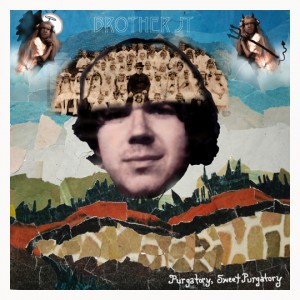
BROTHER JT: I think I’m quite sane. Whereas the world at large has got severe mental problems. I would say false, Pat.
PHAWKER: Fair enough. That’s it for the true or false for the moment. I thought we would jump into another big topic that’s near and dear to your heart. I would like to ask you what role psychedelics play in your creative and/or spiritual pursuits.
BROTHER JT: Well, when I discovered psychedelic drugs I was just sort of like a passive, negative kind of guy, a died in the wool nihilist. I just didn’t see much point in anything. Almost instantaneously upon encountering these things and it seems to open up a whole other spectrum with which to view the world and positivity was instant feature of that new world view and that rounds you out a little as an artist or whatever. To be negative all the time and not even recognize the other side of things, it gets boring. As far as spirituality goes it’s kind of the same thing. Before psychedelics I just dismissed anything supernatural. But my involvement with these substances has changed my perspective dramatically, and I’m a believer of something I just don’t quite know what it is. I know that it’s not of this world, another world maybe, another dimension maybe. It’s made me a pretty staunch believer and I am therefore maybe a little less likely to just be callous about this world. You know, because you feel like there’s somewhere else to go to; this world isn’t necessarily such a drag.
PHAWKER: Good to know. Let’s start at the beginning here and sort of get the narrative arc of your biography down, you know, so that future historians will know. So why don’t we start at the beginning: You’re born and raised in the Lehigh Valley, is that correct? Easton?
BROTHER JT: That’s right.
PHAWKER: Can you try and explain, for the reader that has never been there, the Lehigh Valley.
BROTHER JT: Well, it’s about an hour north of Philly and about an hour and a half west of New York. Nestled in very eastern Pennsylvania near the border of New Jersey. Over 100,000+ people in the area. Known as kind of a hub back in the day when the railroads mattered between New York and Philly. It used to be an industrial area for the most part but now the industries have mostly died off and a certain amount of rot has set in. It’s really not a terrible place to live. I like it because its proximity to nature. You can go to a city like Allentown and within 10 minutes you’re can be in the woods, so that’s a nice feature. Not sure what else to say. It kind of went downhill after Route 78 was built, but that’s another story.
PHAWKER: You’re referring to the super highway that was built connecting New York to…
BROTHER JT: Yeah. I think it just became a lot easier for certain elements or people to run down and just more people could come here, basically. The more the merrier they say, but I don’t necessarily agree with that sentiment. I kind of miss when it wasn’t so crowded, but that’s progress.
PHAWKER: Tell me about your upbringing. What did your dad do for a living?
 BROTHER JT: My dad was a purchasing agent for the Lehigh Foundry, which made the metal couplings that fit pipes together. He worked there most of his adult life. He served in World War II. He was your average man.
BROTHER JT: My dad was a purchasing agent for the Lehigh Foundry, which made the metal couplings that fit pipes together. He worked there most of his adult life. He served in World War II. He was your average man.
PHAWKER: And what about mom, was she a stay-at-home mom or did she do other work?
BROTHER JT: No, she stayed home. I had two older brothers and one older sister.
PHAWKER: And are any of them involved in the rock and roll arts?
BROTHER JT: Not really, but my brother showed me how to play guitar because he had been in a group in the early 70s. He taught me barre chords and that’s pretty much all you need to know in rock n’ roll. In that respect yeah, he still kind of dabbles a little bit.
PHAWKER: So growing up there you caught the tail end of that post-war “Leave it to Beaver,” American as apple pie existence?
BROTHER JT: Yeah. I remember when you would walk down the street and say “hi” to your neighbors, and they would say “hi” back. You know, suburban life, and that’s what it seemed to be, like what you saw on TV was not that far off. But that was a long time ago.
PHAWKER: And, let’s talk about the beginnings of you making music. You already mentioned your older brother teaching you barre chords; where did it go from there? Where was the next significant event on the timeline?
BROTHER JT: There was always music in the house even though not all my siblings were playing music per se. The Beatles, especially — my brothers would get the records as they came out, and I’d hear them, so they totally had a huge influence on me it seemed to be like Beatles were like the template for everything. It was really alluring. After graduating high school I decided I was going to learn to be a recording engineer and I enrolled in a local school for recording engineers. And one of the projects required you to record a band, so I just kind of had the idea, “Well, maybe I’ll write a song and I’ll play it and then I’ll have the other students play along. That was, I guess, the first song I ever wrote, and it was recorded in 1980.
PHAWKER: What was that called?
BROTHER JT: The song’s called “Lacerations.” It was sort of like a mix between rock and roll-y and David Bowie or something.
PHAWKER: And what grade did you get on it?
BROTHER JT: I don’t know if they even gave out a grade it was just part of a project. It was a good experience, actually. It was nice to have 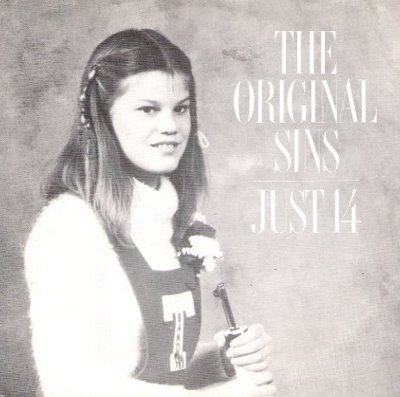 this foundation of knowledge about mixing and tape recorders and microphones.
this foundation of knowledge about mixing and tape recorders and microphones.
PHAWKER: (laughs) Okay. And what was the next big notable moment on the timeline?
BROTHER JT: I would probably say that was the Lehigh University Radio Station WLVR. I was a DJ and that’s where I met a lot of like-minded people. That’s where I met Joe Hanna, who owned Play It Again,. He had a band called Senseless Hate with George Smith and Dave Herzog. I played bass, mostly because I had one. We played three gigs, maybe four, and it was sort of a punk rock, well, not really punk because no one was really a punk in that group. It was a parody of punk. We would hang around his record store which had a bulletin board for MUSICIAN WANTED ads and one of the was for a band called The Creatures, saying “we’re looking for someone who can play guitar who knows these groups…” And it was all these groups from the Nuggets compilation. And I knew all those groups. So I applied for that, a guitarist, and it seemed to be working out ok.
PHAWKER: It’s worth pointing out that at this point 60s garage rock was having its first revival of sorts.
BROTHER JT: This was around ‘85. The Lyres were coming up, and Chesterfield Kings and the Cramps. There really was kind of a big thing happening up in New York. There was a “scene,” so to speak, and the Creatures was sort of the Lehigh Valley’s answer to that, I guess.
PHAWKER: Did you play with a band called The Guns?
BROTHER JT: Yeah that was sort of Senseless Hate without Joe. That was George Smith’s thing. Again, we only played three or four shows and then George went on to be in something called Dick Destiny & The Highway Kings. That’s when I joined The Creatures.
PHAWKER: And then came the Original Sins. They were sort of born out of that experience, right, or concurrent with that?
BROTHER JT: I had started writing more and more songs, I wrote a bunch for The Creatures that were in that Nuggets style but I was writing other songs that didn’t really fit the Creatures. So I thought, why not get together another band to play these songs. So I started playing those songs with The Creatures rhythm section, which was Dave Ferrari and Ken Bussiere. The Creatures had a recording session and there was some tape left over and we asked if we could record these other songs and that wound up being the first Original Sins recording session. That would have been about 1986 and out of that came a song called “Just 14” The brother of a friend of mine was just starting up Bar None Records in Hoboken, and he seemed to like it, wanted to put out a single so we needed to put together a group. That’s when we got Dan McKinney on keyboards.
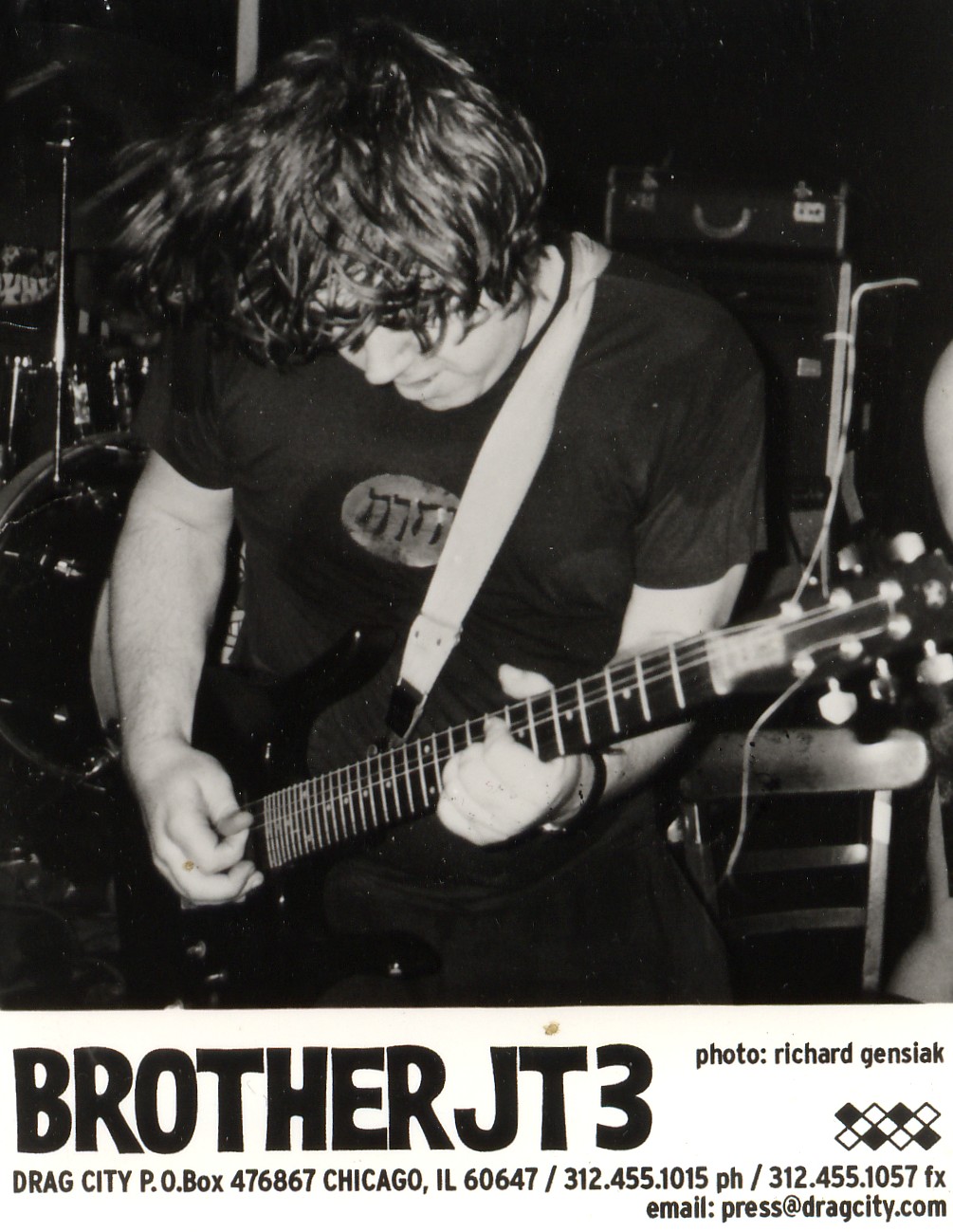 PHAWKER: We should point out here, listeners might not be aware the song “Just 14,” the full lyric was “She’s just 14 and I don’t care,” which still retains its power to shock and offend. And the B-side was “Sugar Sugar” is that correct?
PHAWKER: We should point out here, listeners might not be aware the song “Just 14,” the full lyric was “She’s just 14 and I don’t care,” which still retains its power to shock and offend. And the B-side was “Sugar Sugar” is that correct?
BROTHER JT: That’s right. A trippy, lo-fi version of “Sugar Sugar” that I recorded on my four-track.
PHAWKER: So then the Sins thing sort of starts taking off, and presumably this created some tension in The Creatures and eventually there was a line drawn in the sand.
BROTHER JT: Yeah I guess, I mean what happened was there was a band practice, this is after it was known that “Just 14” was going to be put out by Bar None. I think there was a practice and the other two guys from The Creatures didn’t show up, and we took this as a sign that maybe, well, maybe that’s their way of saying “that’s it,” and that was fine with us. There was never like a scene where it was like “hey, you’re fired” or “we quit.”
PHAWKER: Okay. So now you are “Just 14” comes out, garners a lot of praise and consternation.
BROTHER JT: Yeah, I think that it was coming out like 1987. There was a lot of great underground music coming out. I think what it was that, for me, what I was trying to do was create a Jesus & Mary Chain sound, but instead of a bunch of feedback over pop songs it was a lot of feedback over a Motown R&B thing. It got a lot of rave reviews and sold well enough that Bar None asked us to make an album, which wound up being Big Soul.
PHAWKER: Which the New York Times would later designate as one of the ten best records of the ’80s, correct?
BROTHER JT: I don’t know exactly what the criterion was for that whether it was best unknown records or I don’t know what but…
PHAWKER: I think it was flat out one of the best records.
BROTHER JT: Well, it was very nice of them to say that (laughs).
PHAWKER: But you guys were never really one of these bands that got in a van and just toured constantly, correct?
BROTHER JT: Not at all. I got into this late, by 1987 I was 25. I never went to college or anything so whatever job I could get I would cling to for dear life. It always seemed like everybody in the band was sort of that way. It was hard to just take out off a month from your job if you have a regular job and say “look we’re gonna go on tour,” whereas if you’re 18 or 19 you could do that.
PHAWKER: And at the time you were driving a delivery truck for was it The Morning Call in Easton?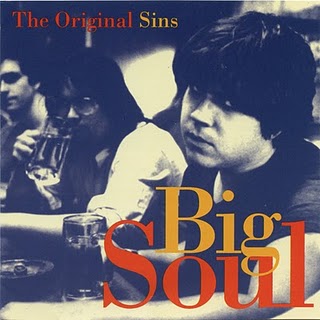
BROTHER JT: It was The Bethlehem Globe Times. But yeah, playing seemed to be the wise thing to do. We had offers occasionally but it was hard for me to tell the other guys, “hey, basically quit your jobs; let’s start doing this for real.” Because I never really felt there was going to be another tour right after that it just wasn’t something you could really count on. Also if you’re a punk band or a ska band or Christian rock band or something, where you have a built in market. I think it’s a lot easier to pull that kind of thing off, because there’s already a crowd that’s going to be there wanting to see and hear what you’re doing. We were always in between and unclassifiable. People called us garage rock and I guess that fits but we did all sorts of things. Didn’t sound particularly like any really tight format of music. That was what I liked about what we did, but it also held us back.
PHAWKER: Looking back now do you regret that choice? Do you wish that you guys had just gone for it and maybe just saw what would’ve happened and then just picked up the pieces in the worst case?
BROTHER JT: Probably do but the thing about regret is that I don’t feel like it’s an honest thing. If I went back in time now, with what I know now, I probably would, but, it’s like, that’s not who we were. I mean, I had an audition to play guitar with Yo La Tengo around that time. I did a practice with them and at the end I told them I really kind of want to follow what I’m doing. If I had some foresight maybe I would have shut-up and joined Yo La Tengo.
PHAWKER: So the Sins soldiered on for several more years, and I guess one more notable touchstone in the bands career was Peter Buck, the guitarist from REM, took an interest in you guys and eventually brought you down to Athens, Georgia to record an album with him producing.
BROTHER JT: They had seen us when we played down in Athens the previous year when we took a little jaunt through the South. I have to give props to Dave Stein who was our manager for five years. He really was the architect behind that and behind the tour that we did that led to meeting Pete Buck and getting him to produce the album. Dave really kept the group together, eventually us a tour of Europe and got our video [for “Just Want To Watch You Dance”] on MTV. He really tried. But after we parted ways that was pretty much the end of the Original Sins. I certainly stopped trying [to make it big in the music biz].
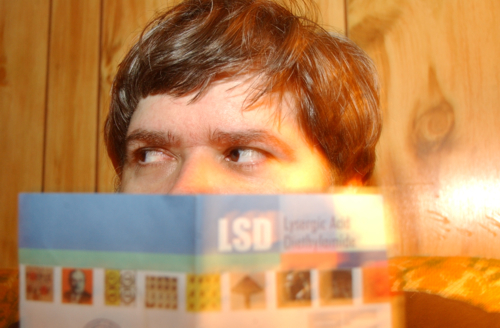 PHAWKER: Okay. So it was about this time that the Brother JT persona was developed is that correct?
PHAWKER: Okay. So it was about this time that the Brother JT persona was developed is that correct?
BROTHER JT: I did some experimental psychedelic stuff with multi-tracked guitars and droney vocals.
PHAWKER: Meshes Of The Afternoon, that was one of those?
BROTHER JT: Yeah, it was around 1990, when there wasn’t a lot of that going on so it probably stood out. Eventually it got put out on Twisted Village Records thanks to the efforts of Byron Coley, the famous rock writer. He kind of gave me the moniker Brother JT. They wanted to do another record so I did another record and it just kind of went on from there.
PHAWKER: Okay; and how do you contrast what Brother JT was doing, or does, with what The Sins were? It’s much less straight up rock, although there were records that still were straight up rock.
BROTHER JT: Yeah well, I look at it as sort of coming from the same pool of influences but applying a different formula. The Sins were very tight and polished and about trying to get people in small clubs to dance. Brother JT was a lot more instinctual and minimalist and a lot of improv — we didn’t practice Brother JT.
PHAWKER: And how about the persona? Your on-stage persona at this time was evolving into sort of a Southern preacher thing crossed with a Manson family member.
BROTHER JT: Back then live performance seemed to be either about demonstrating how great your musical chops were or how unhappy you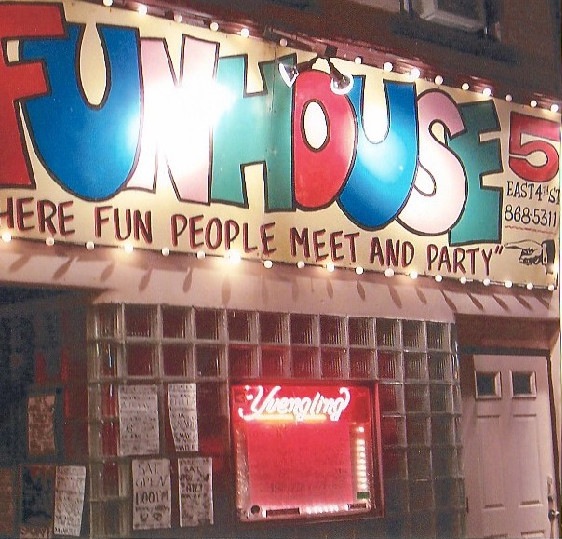 were with the world but the bottom line it was always about the guys on stage. And I was trying to make it about the audience, I was trying to say ‘this could be a way for us to connect’, which was not a very cool thing at the time. Which to my mind meant the time was right for that kind of thing.
were with the world but the bottom line it was always about the guys on stage. And I was trying to make it about the audience, I was trying to say ‘this could be a way for us to connect’, which was not a very cool thing at the time. Which to my mind meant the time was right for that kind of thing.
PHAWKER: Hang on a second I’m trying to find something here. There’s this great line in the Jesus Guitar book, where you’re talking about standing at the Fun House on a Thursday night waiting to get paid, a looking out at the end of a dark smoky bar and thinking to yourself that you’d probably end up dying there and that would have been just okay with you. Maybe you can talk a little bit about the Fun House and what role that played in all of this?
BROTHER JT: Okay, well the Fun House is a small bar in Bethlehem that sort of looked like a haunted house. It was pretty much the only place in town that would hire original rock bands. I played there with The Creatures first in ’85 and then with the Sins through to probably about 1998, so about 13 years or so. We probably played there at least once a month for 13 years. A lot of things went down there, I saw some crazy things.
PHAWKER: Can we jump back to the psychedelic thing for a second here? Would you talk about your earliest psychedelic experiences? Are you fine talking about this or would you rather not?
BROTHER JT: Yeah, sure, it’s no problem. As with everything else I stared late. I would probably say something like 1982 or 1983. It was when I was maybe about 20. I’m not sure exactly what it was; I’m told it was mescaline. It was just through a friend, who said “Why don’t you try this?” I was kind of eager to because so much of the music I loved seemed to have been inspired by psychedelic drugs.
PHAWKER: And by your estimate how many times have you tripped since?
BROTHER JT: Well, I would say I’ve taken a great deal, in small doses. Certainly I’ve taken my share of larger doses but comparatively… probably… I really couldn’t even venture a guess. When it’s around, probably once a week. But then it wasn’t around for years in the late 90s. And then suddenly it was back around again. My feeling is that I use it almost like Prozac, a small, small amount. Helps me get over the hump of living, and being interested in things and all that. As far as just like real trips, probably a hundred times. And a lot of times when performing. Once again usually not debilitatingly so, just enough to get me interested.
PHAWKER: Okay, and let’s jump forward here to some of your other non-musical projects. You’ve also done sort of a series of self-published books.
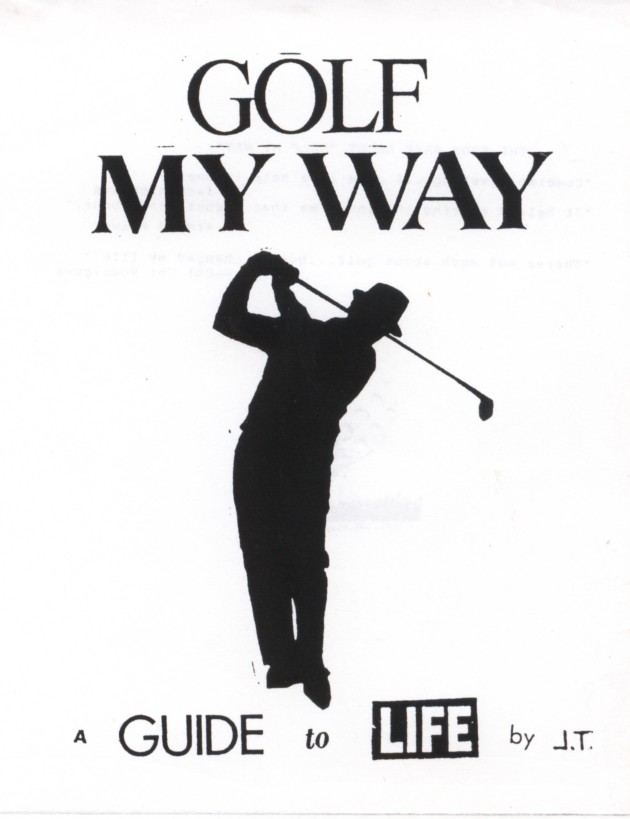 BROTHER JT: Yeah, if you want to call them that. They were just something that I did myself that was stapled together and xeroxed. This is pre-Internet. I did one called Coca Cola and that was just sort of a freewheeling compendium of my thoughts about America’s favorite soft drink and it’s connection to the more sinister elements of American society and tried to tie it all together with lots of Masonic lore. You know, like when they arrested Oswald he was drinking a Coke — it was sort of a spoof of all the conspiracy theory stuff. I did one called Golf My Way and a little comic called Tab that I did in one night.. and that probably came out around 1990, around that period. That was probably about.
BROTHER JT: Yeah, if you want to call them that. They were just something that I did myself that was stapled together and xeroxed. This is pre-Internet. I did one called Coca Cola and that was just sort of a freewheeling compendium of my thoughts about America’s favorite soft drink and it’s connection to the more sinister elements of American society and tried to tie it all together with lots of Masonic lore. You know, like when they arrested Oswald he was drinking a Coke — it was sort of a spoof of all the conspiracy theory stuff. I did one called Golf My Way and a little comic called Tab that I did in one night.. and that probably came out around 1990, around that period. That was probably about.
PHAWKER: And then you were also doing a series of paintings that were like commemorative stamps, I remember you did one of Oswald posing with the newspaper and Mannlicher-Carcano.
BROTHER JT: Right, right. There was a zombie Elvis and the zombie Apollo astronauts. Yeah, I had my paddle in many streams.
PHAWKER: (Laughs). Now tell me, to what extent was this stuff just tongue-in-cheek and to what extent was this sincere piecing together of a world view, of an alternative narrative of America that you thought actually was truer than the one presented in history books.
BROTHER JT: I was just shooting up in the air and seeing what comes down.
PHAWKER: Do you think it’s fair to say that you’ve gradually evolved into a a notable outsider artist status, to someone like a Jandek?
BROTHER JT: I feel like I have a pretty good body of work. I think the problem is that it’s not outsider enough. [laughs] I just feel like I don’t know what my standing is. I know some people like it, but I don’t even try to think about it that much because I just want to concentrate on what I’m doing. I’m just assuming no one hears or sees anything I do, because if I really thought about the amount of people that hear or see what I do it would probably bum me out. So it’s better to just assume nobody is going to see or hear it. But I still want to do it, because I take pleasure in creating it. You get a nice feeling of accomplishment when make something. So I’ll just keep doing it on the outside of things and hope that some of it sticks.
PHAWKER: You also branched out into sort of, for lack of a better word, a TV persona. You had a short-run show called Someone’s In The Kitchen With JT, which was hilarious.
BROTHER JT: Yeah, I heard there was a contest on the Food Network where they were asking people to send in their idea of a cooking show. So I thought “Gee, I could do that.” So I thought I’ll just have at it. Problem is I sent it in about two years after the deadline (laughs). But it kind of made me do it so that was kind of like my first foray into the wonders of digital video — you load stuff into your computer and edit it. You know, it was really amazing technology. Lately, I’ve been hard at work doing various things like that.
PHAWKER: Hold up we’ll get to this in a second, but just to finish up quickly, JT, your recipe was for a grilled cheese, correct?
BROTHER JT: That’s right, yes it was a grilled cheese. It wasn’t really the cheese it was processed cheese product. Food product; it was processed cheese food product, because, you know, cheese isn’t really that good for you.
PHAWKER: Is that episode up on YouTube somewhere?
BROTHER JT: I think only elements of it because believe it or not it was over 25 minutes long and on YouTube you get a ten minute limit unless you’re a “producer,” as they call you, so I could only put out five minute segments but I think there are a couple of the highlights out there but not the whole thing.
PHAWKER: Moving ahead, you did Trippin’ Balls, with Mark Brodzik with Woodshop Films. Is it still ongoing? It’s been a while…
BROTHER JT: Oh yeah. We do them in the fall and shoot a bunch at once. It’s basically me just sitting with a guest talking to them about hallucinogenic drugs, and I kind of played the role of Brother JT. We usually have a few drinks, and hopefully people will feel free enough to talk about that stuff. Sometimes they do and sometimes they don’t. [laughs] It’s a touchy subject.
PHAWKER: Your latest video project is the series Rockology 101, which are, by the way, hilarious. Tell me about that. That seems, actually, very similar, and are you doing that by yourself?
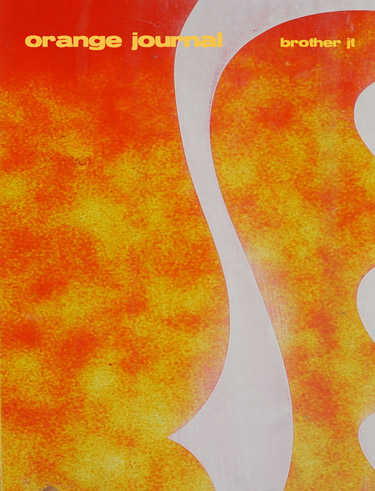 BROTHER JT: Yeah, that’s actually just me. It only really took one night to shoot. It’s just me and a chair, and a remote so I can do zoom in and out and shut off the camera. It’s not improvised, it’s all scripted. What took more time was what you would call the “post-production” stuff. I had to make up these songs for these fictitious “Pioneers of Rock n’ Roll,” and make up slideshow that explains why the soul needs rock n’ roll to revitalize itself, all these kind of educational aids that are included. Basically I stepped in where MTV let us down and made the case for the importance of rock n’ roll in our lives. It’s one of the last things left that can get us going and if you do it right, who knows what could happen.
BROTHER JT: Yeah, that’s actually just me. It only really took one night to shoot. It’s just me and a chair, and a remote so I can do zoom in and out and shut off the camera. It’s not improvised, it’s all scripted. What took more time was what you would call the “post-production” stuff. I had to make up these songs for these fictitious “Pioneers of Rock n’ Roll,” and make up slideshow that explains why the soul needs rock n’ roll to revitalize itself, all these kind of educational aids that are included. Basically I stepped in where MTV let us down and made the case for the importance of rock n’ roll in our lives. It’s one of the last things left that can get us going and if you do it right, who knows what could happen.
PHAWKER: So you are not of the opinion that rock is dead or irrelevant? You still see it as a vital cultural force with the capacity to be art or mind expanding or educational.
BROTHER JT: I think if we can get people to just kind of come out of their trance for a little bit and be real, that’s great. Plus, real knowledge of where this stuff comes from skips a generation and I was actually going to do a serious educational thing about the origins of rock n’ roll but then I decided it would probably be better if it was just funny.
PHAWKER: And then your latest project is the sort of a book/companion CD or vice versa. Orange Journal is the title of the book and Any Stort In A Porm is the title of the CD, and I’ll let you explain both of these for the uninitiated.
BROTHER JT: So I started this about back in February of ’09. I was thinking about ways to write more interesting lyrics and I read about this exercise where you are just supposed write the first thing that comes into your head and most of it will be bad but you will probably find a few things that you can use. So I decided I would keep doing it until I filled up a spiral bound notebook, it took about a year. After some inspiration, some paper inspiration. [chuckles] it really kind of took off, and I swear at some point the pen just started moving in my hand, like automatic writing. I did this drawing of a lion next to some trees, and it was more like I was watching my hand draw it. I was just like ‘why did I draw that?’ And then after that the words started coming out more forcefully, and I felt like I had tapped into my subconscious. There were moments when I felt like somebody else was writing this. My previous writings which were very self-conscious, I can’t really bare to read them five years later. But this stuff I still really enjoy, because it’s not me. It was more like I was hearing voices or channeling other voices. I sort of feel that I was doing a service to those voices, that I was giving them a chance to speak. And that became The Orange Journal Book. Then it occurred to me that this would be a good way to package a CD, especially since some of the chapters ended with a song.
PHAWKER: Tell us about your latest combo book/cd release Black Journal/Non Compos Mantis…
BROTHER JT: BLACK JOURNAL was done pretty much the same as ORANGE JOURNAL — hand-written, spontaneous scrawlings under the influence of various ‘medicines’ that gave voice to various disembodied spirits, or whatever. The main difference is that BJ is in a smaller scale to save on printing costs and primarily in typeface — to be more accessible to the reader’s eye). The companion CD, NON COMPOS MANTIS, again incorporates text from the book into about half of the songs as lyrics, but this time features live drums by Jamie Knerr — last year’s ANY STORT IN A PORM was all drum machines — and gives more of a passing nod to the 60’s garage-hybrid sensibility of my first band, the Original Sins, on a number of the tracks.
PHAWKER: We’re coming to the end I think, but can we talk a little bit about the evolution of music, the delivery of music, the music business in your time, going back to… I guess the first question I would ask is: Do you still listen to vinyl? What are your thoughts on vinyl?
BROTHER JT: I have nothing against vinyl. I don’t really listen to it a lot because most of what I listen to is in my car or in a car of some kind. 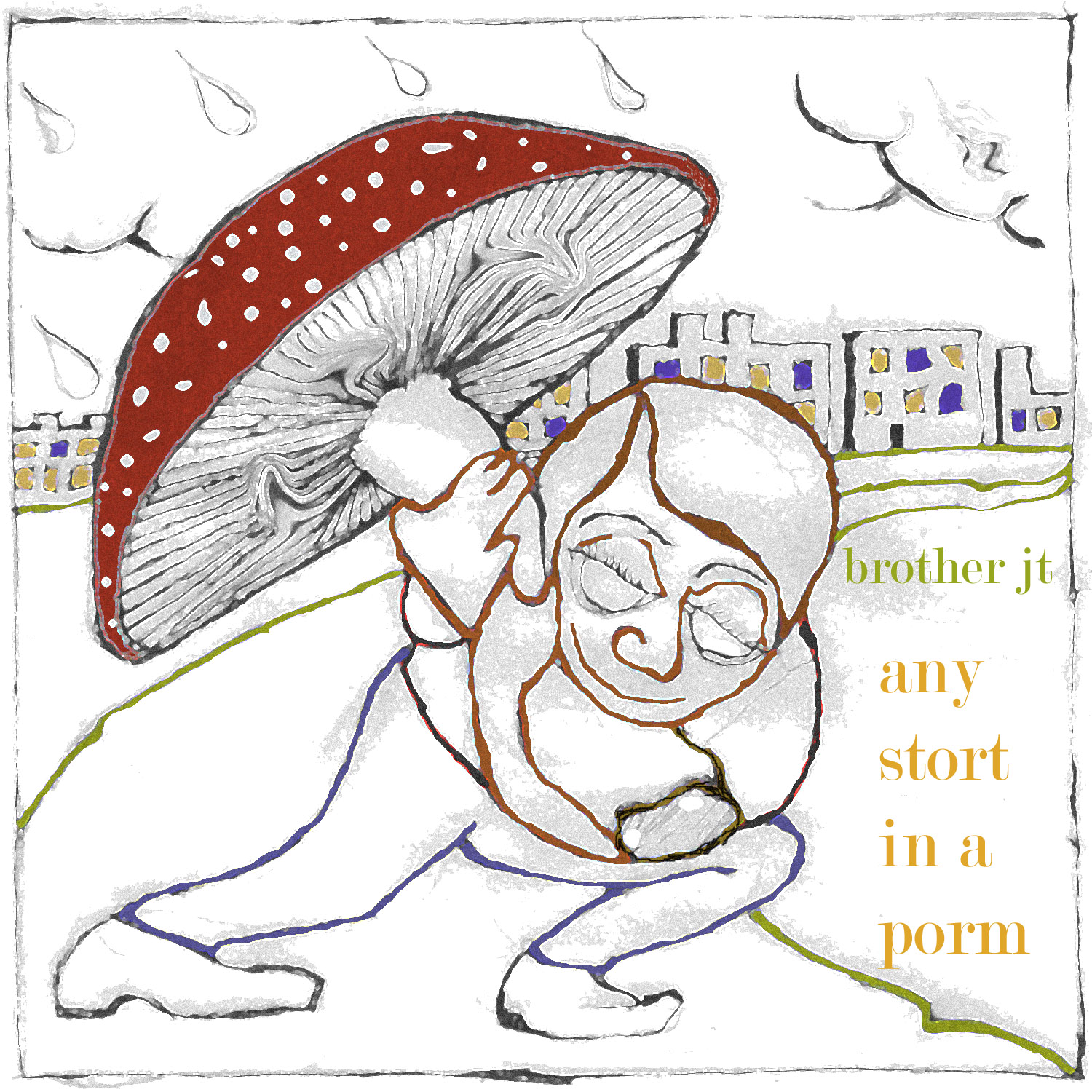 There’s not a lot of times I go home and put on an album. I was actually happy when CDs came along because you could play them for ten years and they still sound about the same as when you got it whereas records, no matter what you do with them, they wear out.
There’s not a lot of times I go home and put on an album. I was actually happy when CDs came along because you could play them for ten years and they still sound about the same as when you got it whereas records, no matter what you do with them, they wear out.
PHAWKER: And what’s your feeling about mp3s?
BROTHER JT: How do you mean?
PHAWKER: Are you one of these people who turn their nose up at it?
BROTHER JT: No, not at all. I think it’s wonderful that I can just get one song (laughs), you know, from certain albums. See, for me, I don’t even really care that much about sound quality. I know that the quality isn’t as good, but I’m just trying to get a feel for something, I don’t need hermetically sealed perfection, you know? I just want to get the feel of the song and take what I can from it, be inspired or not. These are great times, technologically speaking, everything is so much easier. On the other hand, that also leads to a glut of stuff out there and it’s harder to cut through the clutter. Everyone has access now, and everyone wants to have a band now, too. [laughs] Democracy in action, I guess. Kind of overwhelming to me.
PHAWKER: I think that’s a good place to stop, unless there’s anything you want to add, or anything else you’d like to talk about?
BROTHER JT: Well, I appreciate the and I hope that I explained things well enough.
BROTHER JT + PHOTON BAND + PLAY JOHNNY BRENDAS SATURDAY JULY 6TH

